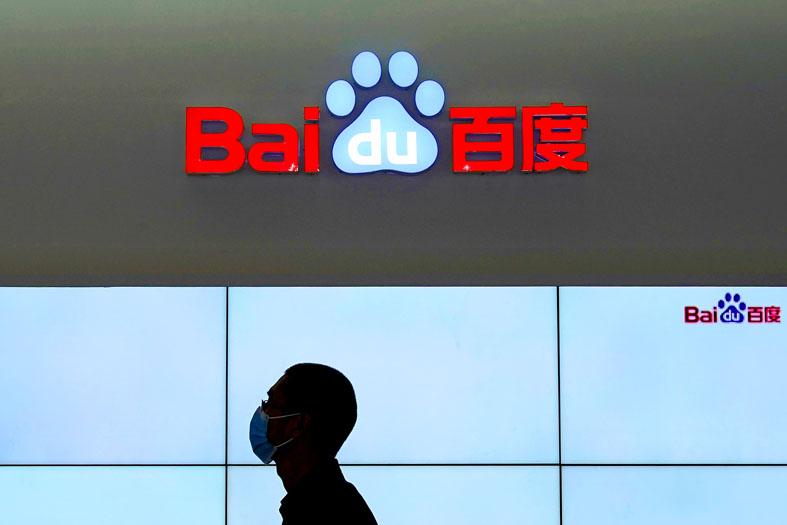The Chinese State Administration for Market Regulation on Friday fined some of its largest tech giants, including Tencent Holdings Ltd (騰訊), Baidu Inc (百度), ByteDance Ltd (字節跳動) and Didi Chuxing (滴滴出行), for past acquisitions and investments as it stepped up its crackdown on the sector.
Pony Ma’s (馬化騰) Tencent is being fined 500,000 yuan (US$77,000) for its 2018 investment in online education app Yuanfudao, the agency in a statement.
Baidu was fined the same amount for its 2014 takeover of Ainemo Inc, a maker of consumer electronics including voice-controlled speakers.

Photo: Reuters
The firms are being sanctioned for not seeking prior approvals for the deals — a breach of China’s anti-monopoly laws — although the agency determined that the deals themselves were not anti-competitive.
Tencent and Baidu join fellow behemoth Alibaba Group Holding Ltd (阿里巴巴) in coming under fire from the regulator, as Beijing steps up efforts to rein in its once free-wheeling technology industry.
The regulator last year issued fines against Alibaba and Tencent unit China Literature Ltd (閱文集團) for similar breaches.
“The message is clear that seeking government approvals in deals like these are a must,” said Ye Han (葉涵), a partner at Beijing-based law firm Merits & Tree, who specializes in antitrust and mergers and acquisitions.
“While we haven’t seen cases where companies got broke up or mergers got unwinded, such evaluations are likely going on behind the scene,” Ye said.
Didi Mobility Pte (滴滴移動), a unit of ridehailing giant Didi Chuxing, and Japan’s SoftBank Corp were also issued fines of 500,000 yuan each — the maximum penalty possible — for setting up a joint venture without permission.
A ByteDance unit and its partner Shanghai Dongfang Newspaper Co were also penalized the same amounts for a 2019 partnership that created a video-copyright venture.
ByteDance said that the joint venture has since been canceled.
Technology companies such as Tencent had previously carried out mega mergers and acquisitions through so-called variable interest entity structures, which operate on shaky legal grounds.
The new antitrust rules, accompanied by the fines handed down by the regulators, are a signal that the structures are now under their oversight.

Intel Corp chief executive officer Lip-Bu Tan (陳立武) is expected to meet with Taiwanese suppliers next month in conjunction with the opening of the Computex Taipei trade show, supply chain sources said on Monday. The visit, the first for Tan to Taiwan since assuming his new post last month, would be aimed at enhancing Intel’s ties with suppliers in Taiwan as he attempts to help turn around the struggling US chipmaker, the sources said. Tan is to hold a banquet to celebrate Intel’s 40-year presence in Taiwan before Computex opens on May 20 and invite dozens of Taiwanese suppliers to exchange views

Application-specific integrated circuit designer Faraday Technology Corp (智原) yesterday said that although revenue this quarter would decline 30 percent from last quarter, it retained its full-year forecast of revenue growth of 100 percent. The company attributed the quarterly drop to a slowdown in customers’ production of chips using Faraday’s advanced packaging technology. The company is still confident about its revenue growth this year, given its strong “design-win” — or the projects it won to help customers design their chips, Faraday president Steve Wang (王國雍) told an online earnings conference. “The design-win this year is better than we expected. We believe we will win

Chizuko Kimura has become the first female sushi chef in the world to win a Michelin star, fulfilling a promise she made to her dying husband to continue his legacy. The 54-year-old Japanese chef regained the Michelin star her late husband, Shunei Kimura, won three years ago for their Sushi Shunei restaurant in Paris. For Shunei Kimura, the star was a dream come true. However, the joy was short-lived. He died from cancer just three months later in June 2022. He was 65. The following year, the restaurant in the heart of Montmartre lost its star rating. Chizuko Kimura insisted that the new star is still down

While China’s leaders use their economic and political might to fight US President Donald Trump’s trade war “to the end,” its army of social media soldiers are embarking on a more humorous campaign online. Trump’s tariff blitz has seen Washington and Beijing impose eye-watering duties on imports from the other, fanning a standoff between the economic superpowers that has sparked global recession fears and sent markets into a tailspin. Trump says his policy is a response to years of being “ripped off” by other countries and aims to bring manufacturing to the US, forcing companies to employ US workers. However, China’s online warriors